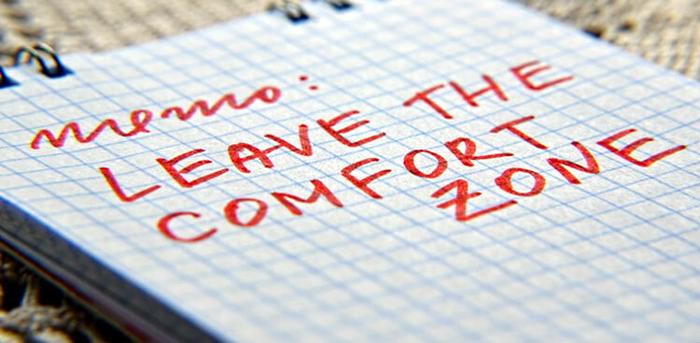
There’s a guy I know who’s simply amazing at his job. He’s an executive level creative at a global marketing agency, and besides being great to work with, he has an eye for visual design that’s pretty much unparalleled. He rocks it every single time.
But he’s also terrified most of the time; he told me as much. As good as he is, and as good as he’s proven himself to be, he’s scared that the next project will go spectacularly wrong or that it won’t be beautiful in the ways he knows it can be.
How can he be so good at what he does and still be so scared?
The answer’s actually pretty simple—because he’s always pushing at the edges of his experience and straying into new territory.
He’s not afraid to be uncomfortable.
Think about it. A job that offers only comfort is a job that’s completely familiar. There are no surprises. Everything the job requires, you’ve done before. It’s predictable, safe, and duller than dirt, and it might seem as though such a job would be a solid choice for a risk-free way to earn a few bucks.
But the longer you stay somewhere out of the desire to be safe or comfortable, the more your worldview narrows, the more your confidence gets eroded, and the more your sense of who you are diminishes.
You might forget why you took the job in the first place. All kinds of tiny things start annoying and frustrating you. You worry about risk and change more than you ever did before. You don’t remember what your best looks like, and joy becomes a concept that’s more and more elusive.
This is how people slip into a rut, with the initial appeal of comfort becoming a bad habit that’s increasingly hard to break. As that rut gets deeper, the greater the gap between where you are and where you could be, and the more frustration, stress, and anger leaks out.
Discomfort, on the other hand, means that you’re out there exploring. It means you’re in a place you haven’t been before; maybe you’re learning a skill for the first time that makes you feel clumsy or incompetent. Maybe you’re applying an existing skill in an entirely new way, like problem-solving your way through a whole new bag of issues or building rapport with C-suite execs. Or maybe you’re in the spotlight like never before, perhaps because you get to call the shots or perhaps because others value your insights.
Problem is, discomfort comes with fear, doubt, and second-guessing, and our preferred response to those things is to pull back and go back to where we feel safe.
So here’s the trick: Stop thinking that you shouldn’t be uncomfortable and that discomfort is bad or unwanted. It’s not even that you need to start thinking that those things are good or desirable. It’s simply seeing them as a thing that happens from time to time, and still coming at them with everything you are.
Comfort and safety can be far more damaging to you in the long-term than discomfort and risk, particularly in today’s world. Which leads us to one big question:
If you could find comfort in the uncomfortable and feel safe amid the unknown, what difference would that make to you?